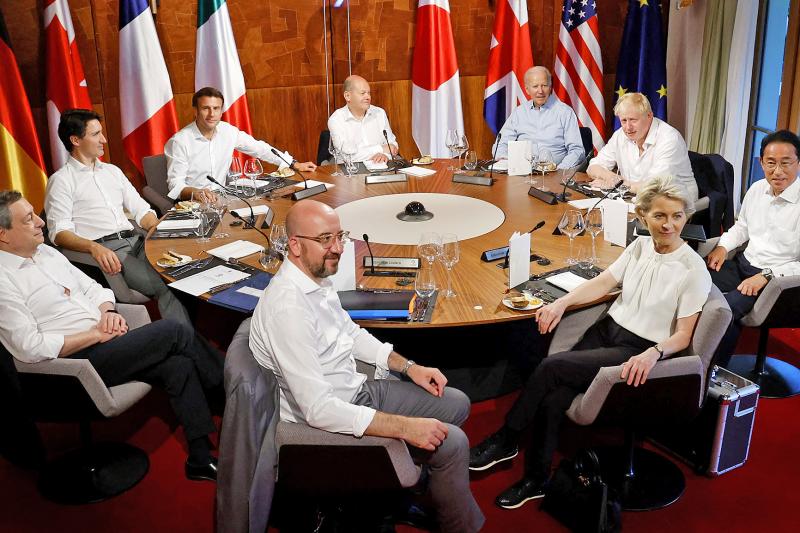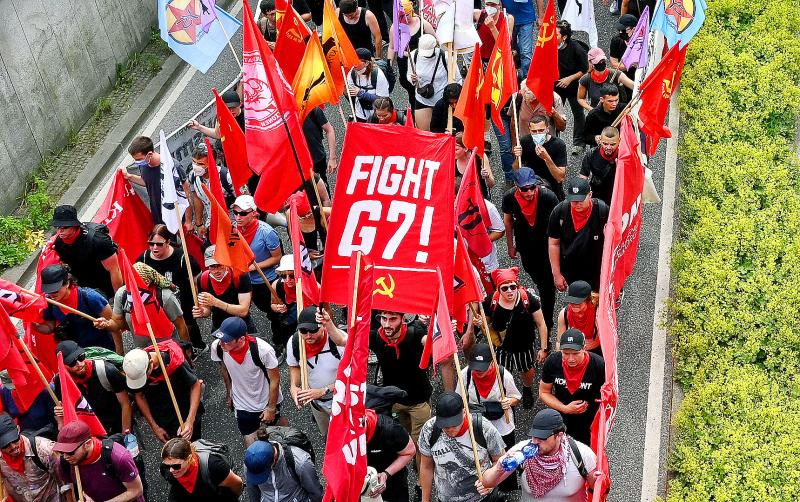US President Joe Biden rebooted his effort to counter China’s Belt and Road Initiative (BRI) after an earlier campaign faltered, enlisting the support of G7 leaders at their summit in Germany.
The Build Back Better World initiative, named after Biden’s domestic spending and climate agenda, struggled to get off the ground because not enough G7 partners contributed financially when it was unveiled a year ago, people familiar with its lack of progress said.
“When democracies demonstrate what we can do — all that we have to offer — I have no doubt that we’ll win that competition every time,” Biden said during an event on the sidelines of the summit.

Photo: AFP
The plan has been rebranded the Partnership for Global Infrastructure and Investment, and the US is calling on leaders to agree to fund the launch of projects in middle and low-income countries to the tune of US$600 billion over the next five years.
It would consist mostly of private sector investments, with some funding from the US International Development Finance Corp and the US Export-Import Bank, as well as commitments from foreign governments.
The US would contribute US$200 billion in total, although it is unclear what the split would be between private and public sector funding, and how the government plans to convince companies to take part.

Photo: AFP
There is the potential for the same challenges to crop up under the initiative’s latest incarnation, in part as the G7 prioritizes other issues such as taming inflation and dealing with the fallout of Russia’s invasion of Ukraine.
Chinese Ministry of Foreign Affairs spokesman Zhao Lijian (趙立堅) said his country welcomed any initiative that promoted global infrastructure at a regular news briefing in Beijing yesterday.
“We believe there’s no such thing as relevant initiatives countering or replacing each other,” he added. “What we oppose are moves to advance geopolitical calculations and smear the BRI in the name of promoting infrastructure development.”
Among the G7-backed projects announced on Sunday are US$2 billion in solar projects in Angola, a US$600 million contract to construct a submarine telecommunications cable that would connect Singapore to France through Egypt and the Horn of Africa, and US$14 million to support a design study for Romania’s deployment of a small modular reactor plant.
The official said the US would focus on investing in projects that help supply chain security by making the US and other allies less reliant on China.
Ukrainian President Volodymyr Zelenskiy joined the summit via video link from Kyiv and said he wants the war to be over by the end of the year, officials familiar with his remarks said.
G7 leaders adopted a declaration pledging to support Zelenskiy and his government “for as long as it takes.”
US President Joe Biden is set to announce the purchase of an advanced surface-to-air missile defense system to help protect Ukrainian cities.
Zelenskiy addressed each of the leaders individually with a specific comment, the officials on condition of anonymity.
He requested support on flight defense systems, security and financing for reconstruction, as well as help on unblocking exports of the country’s grain.

ROLLER-COASTER RIDE: More than five earthquakes ranging from magnitude 4.4 to 5.5 on the Richter scale shook eastern Taiwan in rapid succession yesterday afternoon Back-to-back weather fronts are forecast to hit Taiwan this week, resulting in rain across the nation in the coming days, the Central Weather Administration said yesterday, as it also warned residents in mountainous regions to be wary of landslides and rockfalls. As the first front approached, sporadic rainfall began in central and northern parts of Taiwan yesterday, the agency said, adding that rain is forecast to intensify in those regions today, while brief showers would also affect other parts of the nation. A second weather system is forecast to arrive on Thursday, bringing additional rain to the whole nation until Sunday, it

CONDITIONAL: The PRC imposes secret requirements that the funding it provides cannot be spent in states with diplomatic relations with Taiwan, Emma Reilly said China has been bribing UN officials to obtain “special benefits” and to block funding from countries that have diplomatic ties with Taiwan, a former UN employee told the British House of Commons on Tuesday. At a House of Commons Foreign Affairs Committee hearing into “international relations within the multilateral system,” former Office of the UN High Commissioner for Human Rights (OHCHR) employee Emma Reilly said in a written statement that “Beijing paid bribes to the two successive Presidents of the [UN] General Assembly” during the two-year negotiation of the Sustainable Development Goals. Another way China exercises influence within the UN Secretariat is

CHINA REACTS: The patrol and reconnaissance plane ‘transited the Taiwan Strait in international airspace,’ the 7th Fleet said, while Taipei said it saw nothing unusual The US 7th Fleet yesterday said that a US Navy P-8A Poseidon flew through the Taiwan Strait, a day after US and Chinese defense heads held their first talks since November 2022 in an effort to reduce regional tensions. The patrol and reconnaissance plane “transited the Taiwan Strait in international airspace,” the 7th Fleet said in a news release. “By operating within the Taiwan Strait in accordance with international law, the United States upholds the navigational rights and freedoms of all nations.” In a separate statement, the Ministry of National Defense said that it monitored nearby waters and airspace as the aircraft

Taiwan’s first drag queen to compete on the internationally acclaimed RuPaul’s Drag Race, Nymphia Wind (妮妃雅), was on Friday crowned the “Next Drag Superstar.” Dressed in a sparkling banana dress, Nymphia Wind swept onto the stage for the final, and stole the show. “Taiwan this is for you,” she said right after show host RuPaul announced her as the winner. “To those who feel like they don’t belong, just remember to live fearlessly and to live their truth,” she said on stage. One of the frontrunners for the past 15 episodes, the 28-year-old breezed through to the final after weeks of showcasing her unique